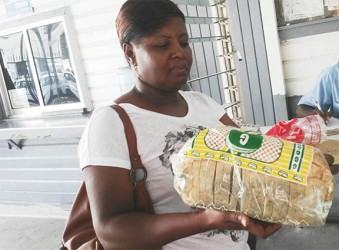A first-time patron of a bakery, who was sold spoiled bread, was denied a cash refund when she returned the item, bringing awareness once again to the lack of efficacy of the Competition and Consu-mers Affairs Act 2011, which outlawed the goods-not-returnable policy that has for years been foisted on consumers.
Michelle Sampson bought a loaf of sliced bread from Graham’s Bakery in Cummings Street on Thursday last at 2 pm.
She said it was not until she got home at 6 pm that she noticed the bread had “mildew” (mould). Sampson said she immediately contacted the bakery by phone and was told that she could not have her money refunded.
The irate woman said she went to the bakery yesterday morning for a cash refund and also demanded a refund of her transportation costs, but was turned down, when she refused the only offer, for the bread to be replaced.

When this newspaper contacted Graham’s Bakery, Manager Rolston Watson said he was aware of the complaint and regretted that the incident had occurred. He blamed the salesperson for selling the stale bread and offered to refund Sampson the $240 she had paid for the bread.
He added that Sampson had met the baker when she visited the bakery yesterday morning “and she refused to take another bread.”
He admitted that the baker refused to refund Sampson’s cash and said it was because he was not authorised to do so. Moreover, Watson said, the incident will be investigated because “nurses and sanitary officials,” were at the bakery yesterday and everything was alright with the bakery.
Sampson said after Watson told her that she should travel back to the bakery a second time to collect the $240 she had paid for the bread she asked that the company stand the cost of her transportation from Diamond to Cummings Street, Cummingsburg ($1500). “It is very unreasonable that I go back there [a second time] for $240,” she said, adding “he ought to know [that the] customer is always right.”
Lamenting that she was not sure Watson was even taking her complaint seriously, Sampson said he then asked her if she had bought shoes that were damaged if she wouldn’t have returned a second time to the shoe store. She questioned the rationale behind his equation of damaged shoes with spoilt bread.
In response to Sampson’s demand for the bakery to refund her transportation cost, Watson said he was not prepared to do that. He said the normal procedure is that customers return the item and be refunded, or given a new batch of the purchase. He added said Sampson’s case is the first time a customer has demanded more than the cost of the purchase.





